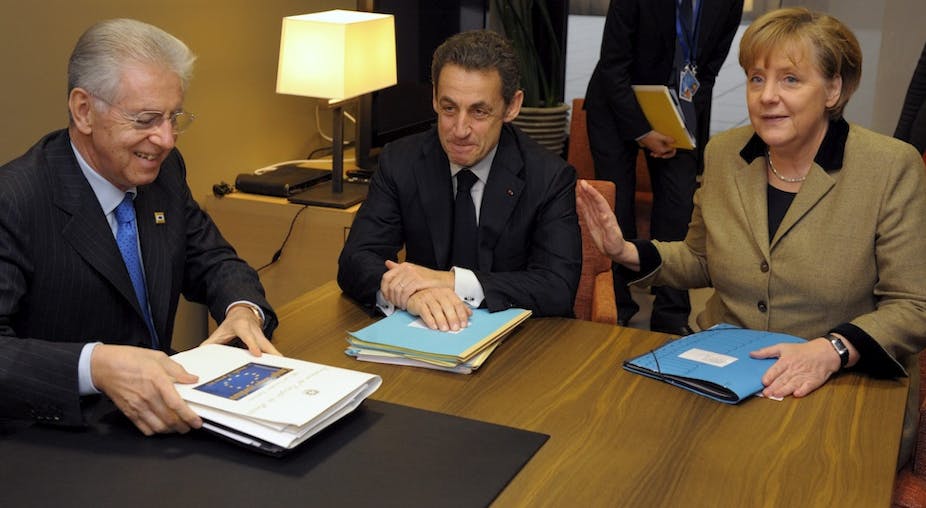Europe this week has voted for tough new fiscal rules aimed at reining in high deficits, as world economic leaders continue to grapple with solving the sovereign debt crisis.
But not all measures have been popular, with a push by Germany to implement controls over Greek spending rebuffed by other Eurozone countries, as talks on a debt swap deal reportedly stalled.
Meanwhile, British Prime Minister David Cameron has threatened legal action if European institutions undermined British interests.
Two experts explain the main outcomes of the summit and its implications for Europe’s sovereign debt crisis.
Harald Scheule, Associate Professor, School of Finance and Economics at University of Technology, Sydney:
Twenty-five of the 27 European countries (excluding non-Euro members the United Kingdom and Czech Republic) have agreed to include measures to limit debt in the receptive national constitutions (that is, the national fiscal deficit can not exceed 0.5% of GDP). In addition, France announced the implementation of a tax on financial transactions of 0.1% and other countries are considering similar arrangements.
The measure is a further step and aims to ensure financial stability in Europe as it limits the excessive increase of debt funding of countries in the future. The measure may be aimed to the medium to long term and additional measures may follow in the future.
The measure may have a limited success in reducing existing debt levels; in particular, solving the financial distress of Greece and Portugal. As a result, the financial distress of these countries and the risk of contagion to other economies is likely to continue.
Further measures (such as additional debt funding through rescue packages or loan modifications) are likely as the debts of distressed countries mature (approximately €15 billion on 20 March 2012 for Greece and approximately €10 billion on 15 June 2012 for Portugal).
Greece is under periodic review by the IMF, EU and European Central Bank, and the current proposal of an overseeing commission would imply a permanent (rather than frequent) review, as well as rules (similar to a waterfall) for Greece’s budget, with a priority for debt repayment.
The notion of an overseeing commission may be controversial - particularly with the Greek population - but an independent body outside existing structures may add great value in terms of efficiency and transparency. In the corporate world, government-appointed receivers are generally the basis of a successful financial turnaround.
Colm Harmon, Professor of Economics, University of Sydney:
The conundrum at the heart of the Eurozone crisis is a tricky one. German Chancellor Angela Merkel, and to a lesser extent France’s President Nicolas Sarkozy, have a political minefield to navigate in trying to explain to their citizens that they should be driving the sort of massive bailout infrastructures needed to solve the problem. Yet, the biggest losers from not containing the banking mess - and indeed the breakup of the Euro - are Germany and France, as their banks and pension funds are massively exposed. For Germany in particular, the collapse of the Euro would obliterate the competitiveness so majestically created over the period since reunification.
So, without doubt, the core role of the treaty agreement is to give Merkel the wriggle room she needs politically. Indeed, perhaps the most important aspect of the treaty is that it pushes forward the move to a larger Eurozone bailout fund that is powerful enough to face down the market.
However, ultimately it feels like an underpowered process. Overall, the core principles of the treaty - which aggressively pushes for stability through austerity, and locks that stability in via constitutional amendment if necessary - seems to have again kicked the problem “can” down the road.
There are fundamental problems: the potential need for constitutional referenda in some countries including Ireland may derail this. More critically, imposition of fiscal rules and legislatively locking in pro-cyclical policies with little if any room to manoeuvre, is going to be a challenge of monumental proportions.
As noted at a conference in Dublin last week by my colleague Frank Barry, this works at one level by attempting to remove the potential for “policy induced” shocks, but does not deal with the fact that Eurozone countries will still have business cycles that are imperfectly aligned, so shocks will still happen.
It feels that the solutions - a European Central Bank that actually acts (as its name suggests) like the Reserve Bank of Australia as the ultimate guarantor or lender of last resort, and a move to greater centralisation of economic and political decisionmaking - are still a step too far.
And by baulking at this, the treaty is perhaps ultimately a sideshow as it does not ensure that countries like Ireland will ever escape the straitjacket of repaying banking debts imposed on the economy.

